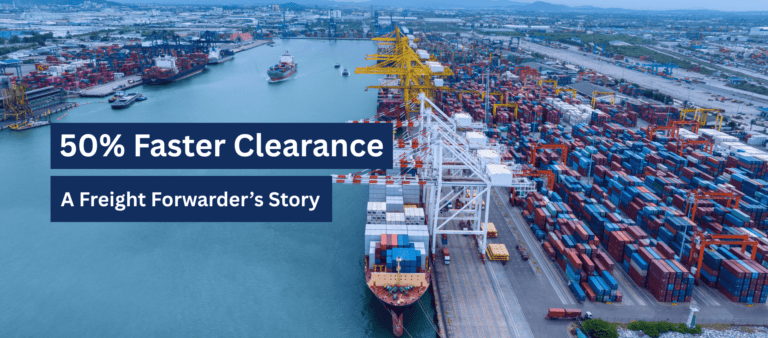AI That Simplifies Trade Compliance and Drives Growth
From Complexity to Clarity: Swift Customs Processing in Freight Forwarding
-
Freya Jane
- Director of Customer's Success
Having trouble getting through customs clearance and complicated international freight forwarding in the UK?
A seamless movement of commodities is crucial if you manage a supply chain, handle customs, or are a business owner who deals with imports or exports. However, managing trade laws across borders and streamlining your supply chain can be challenging.
Did you know that ineffective procedures for clearing customs can cause weeks’ worth of shipping delays, costing companies thousands of dollars?
In this blog post we’ll examine the crucial role freight forwarding plays in an efficient supply chain and typical problems encountered while filing customs reports. Additionally, we’ll introduce you to iCustoms, the top CDS software in the UK, and demonstrate how it can improve your business processes, save you money and time, and guarantee that your shipments arrive on schedule.
Overview of the freight forwarding industry
Transporting goods is a fragment that is part of every business because, without it, no business can progress. Freight forwarding is a significant component, especially for international trading from origin to destination.
It is an important part of the supply chain because it ensures that goods can move smoothly across foreign borders and through different transportation networks. The supply chain and customs declaration businesses require transport and logistics companies to deliver the goods.
The core purpose :
Fundamentally, freight forwarders are seasoned specialists in international trade who enable quick and affordable international transit. They are responsible for planning and managing the movement of products on behalf of importers, exporters, and shippers.
Professionals who comprehend the complexities of international trade collaborate in the sector as freight forwarders, customs brokers, carriers, and logistical providers. They coordinate flawlessly to guarantee the timely and safe transfer of goods across international borders.
Key aspects :
- Competence in Logistics
- Choosing a Carrier
- Coordination of Supply Chains
- Influence on a Global Scale
- Savings on expenses
How does freight forwarding carry out supply chain management?
Managing the supply chain
Logistics providers are the ones who are responsible for managing the freight from arrival to departure. This includes making transportation arrangements, choosing the shipping methods that are most suited, and optimising routes to ensure timely and cost-effective delivery.
Diverse means of transportation
Any freight forwarding company offers a variety of transportation means, such as rail, road, and sea. Each shipment is assigned a mode based on the characteristics of the goods being transported and where they go; this is done following the company’s overarching supply chain strategy.
Alliance worldwide
Thanks to its network, it gives full transportation solutions to companies with international supply chains. They can use the knowledge and infrastructure of different areas to make the flow of things more manageable.
Legality through customs
Minimising risks
Freight forwarders mitigate supply chain risks. They advise on cargo insurance and risk mitigation to protect commodities from damage, loss, or unanticipated incidents during transportation.
Inventory management
Freight forwarders help inventory management by moving items effectively and on time. Businesses avoid overstocking and understocking by maintaining adequate stock levels.
Modularity and Extensibility
Cargo companies give companies the ability to adjust the size of their supply chain activities according to their specific requirements. This adaptability is essential to react appropriately to shifting market conditions and fluctuating levels of consumer demand.
What challenges do freight forwarders face during CDS?

CDS is an essential logistics and supply chain stage, particularly in international trade. During this critical stage of the transportation process, freight forwarders, who act as intermediaries between shippers and customs authorities, face many significant challenges:
Technological advancement
Fleet management businesses have found it increasingly difficult to keep up with the latest technological developments and meet rigid transportation regulations. This causes them to maintain compliance, which then results in delays.
Delays in customs clearance
It can have a domino effect on the supply chain, throwing off schedules and adding to expenses through demurrage fees. This highlights the need for streamlined customs procedures and precise paperwork to avoid delays and costs associated with international trade.
Tariff classification
Correct tariff classification tells shippers how much to pay in customs fees and taxes. It is vital to follow foreign trade agreements because misclassifying goods can have legal and financial consequences. To escape these problems, shippers and freight forwarders must ensure that the correct HS codes are used.
Document management
In order to clear the customs it is important to have all the needed papers. Track record of Bills of lading, certificate of origin and retail invoices, these are the duty of freight forwarders. It is very time taking process and difficult to manage.
Role of freight forwarding and iCustoms in efficient supply chain
Every customs vendor and dealer wants software that controls all the difficulties of customs clearance so that they may have a positive experience declaring their goods with the customs department. Providing trade customs compliance in the UK for export and import is made incredibly simple with iCustoms, the ideal option.
As a link, iCustoms uses freight forwarding services’ application programming interface (API) to connect with it and handle supply chain management for manufacturers and customs brokers. This helps to make the process more efficient and transparent. The ability to maintain compliance and make timely declarations for UK freight has been expanded.
Conclusion:
Efficiency is the most critical factor in determining financial success in the undependable environment of international trade. The obstacles freight forwarders and customs brokers in the UK experience during the customs declaration process are fundamental, but so are the solutions.
iCustoms, your reliable partner, opens the way for more efficient business processes. Do not let delays and problems prevent you from moving forward; instead, take advantage of the capability of iCustoms to guide you through the maze of customs compliance. If you change now, your supply chain will flourish like never before.
Use iCustoms for switching from complex freight to optimised and precise fleet management. Visit us for more information.
FAQs
What are freight forwarding operations?
Professionals in the field, of freight forwarding take care of the logistical elements to ensure that your goods arrive safely, wherever in the world.
Do freight forwarders handle customs?
Yes, a lot of freight forwarders offer customs processing as part of their offerings. By helping to handle the paperwork and legal requirements associated with international shipments, they make sure that the process of clearing products through customs runs more smoothly.
Does a freight forwarder need a licence?
Yes, freight forwarders need to apply for a licence in order to conduct business legally. Countries may have different licencing requirements, therefore it's critical for goods forwarders to abide by local laws wherever they do business.
You may also like:
Automate Your
Customs Process
Reduce Paperwork, Improve Accuracy & Enhance Customs Compliance
Subscribe to our Newsletter
About iCustoms
Automate Your
Customs Process
Reduce Paperwork, Improve Accuracy & Enhance Customs Compliance


